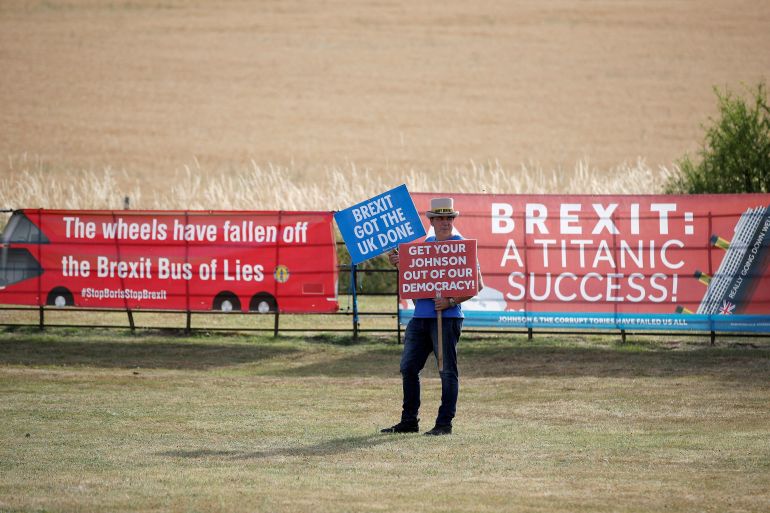Number of Britons regretting Brexit hits new record high: Survey
About 57 percent of Britons tell YouGov pollsters the decision to leave the EU in 2016 was the wrong one.

The proportion of Britons who say Brexit was a mistake has hit a new record high this month, a survey from pollsters YouGov shows.
With few economic benefits to show for the June 2016 vote to leave the European Union, 57 percent of Britons said the decision was the wrong one compared with 32 percent who thought it was correct, YouGov said on Tuesday.
Keep reading
list of 1 itemMore than half – 55 percent – said they would vote to remain in the EU against 31 percent who said they would stay out if the referendum were to be held again.
The YouGov survey of more than 2,000 British people showed 63 percent now regard Brexit as more of a failure than a success compared with 12 percent who saw it as more of a success. A further 18 percent said it was neither.
Prime Minister Rishi Sunak said in May that Brexit is delivering benefits, citing his flagship policy of freeports and value-added tax cuts that he said would make beer and sanitary products cheaper.
Economists said freeports – special zones with tax and customs relief and simplified trade regulations – are unlikely to boost Britain’s economy but may have limited value as a regional development tool.
British business investment has barely grown since mid-2016 in contrast with other advanced economies. While Brexit-supporting economists pointed to the fact that capital grew strongly in the years leading up to 2016 and was bound to slow, business surveys pointed to Brexit as one cause of the stagnation.
International Monetary Fund projections put Britain at the bottom of the world’s major economies in terms of expected growth in 2023 (0.4 percent). In 2022, the UK economy grew by 4.1 percent.
“Prior to the 2008 global financial crisis, the UK had been a strong performer among the Group of Seven countries,” the IMF said last week. “But this momentum was lost in the middle of the last decade. By 2022, real business investment was still slightly lower than in 2016 – in contrast to the 14 percent increase among other G7 economies.”
Many business leaders were infuriated by the governing Conservative Party’s decision to leave the EU’s single market and customs union at the end of 2020 and then by the economic turmoil during the premierships of Boris Johnson and Liz Truss.
Like all companies around the world, the British business community has had to deal with higher energy prices and disrupted supply chains, but they have had further challenges – adapting to new trade rules from Brexit and shortages of workers because EU citizens can no longer travel without visas to work in the United Kingdom as they could previously.
On Monday, Britain added a number of construction jobs to its “shortage occupation list”, which allows the building industry to bring in staff from abroad more easily to help employers struggling to fill positions.
Bricklayers, masons, roofers, roof tilers, slaters, carpenters, joiners and plasterers will benefit from cheaper visas and more relaxed employment criteria under the changes.
The shortage occupation list already includes care workers, civil engineers, laboratory technicians and healthcare workers.